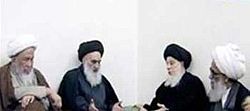- Mohammad Ishaq Al-Fayyad
-
Mohammad Ishaq al-Fayyad Born 1930
Jaghori, Ghazni, AfghanistanKnown for Grand Ayatollah Website http://www.alfayadh.net Grand Ayatollah Mohammad Ishaq al-Fayyad (also Fayad, Fayyadh; Arabic: محمد إسحاق الفياض) (born in 1930) is currently the second most senior Shi'a marja living in Iraq after Ali al-Sistani.[1][2][3][4]
Born in a village in Ghazni Province, Afghanistan to Hazara parents, he holds Iranian and Afghani citizenships. His family were farmers and he started learning the Qur'an from the village cleric when he was five. When he was 10 his family moved to Najaf where he studied various Islamic studies including Arabic language, rhetoric, logic, Islamic philosophy, the Hadith and Islamic jurisprudence, eventually studying under Grand Ayatollah Abu al-Qasim al-Khoei. When al-Khoei died in 1992 he supported Ali al-Sistani as the chair of the marjaiya in Najaf.[5]
Under Saddam Hussein he adopted a quietist approach, avoiding politics and confrontation with the government.[6]
Following the Invasion of Iraq by the United States and allies in 2003, al-Fayyad engaged more than any other marja with the occupying American and British military and diplomats, informing them of the views of the senior clerics. He adopted similar positions to al-Sistani and the other marjaiya: supporting a united Shiite slate for the first Iraqi elections; calling for Islam to be the sole source of Iraqi law;[7] supporting a yes vote in the referendum on the constitution;[8] rejecting a secular Iraq;[9] and opposing the adoption of doctrine of the Guardianship of the Islamic Jurists as adopted by the Islamic Republic of Iran.[5] However, of all the marja'iyya Fayyad is reported to be the biggest opponent of the concept of the Guardianship of the Islamic Jurists.[10] However, this report is contradicted by the official website of the Shi'a Marja, wherein he remarks, "The correct opinion regarding the issue of "Vilayat-e-Faqih" (Guardianship of the Islamic Jurist) is that this issue requires no external proof, because the continuation of Islamic law, and its application, is dependent upon the continuation of the system of Vilayat". He continues, "The vilayat of the Prophet and the immaculate Imams, and in the time of the major occultation of the 12th Imam, the Islamic Jurist is bestowed with this vilayat...It is unimaginable that Islamic Law could continue to exist without the continuation of this vilayat".[11]
In 2007 press reports indicated that he was supervising the religious studies of the radical cleric Muqtada al-Sadr.[5]
References
- ^ List of Maraji in Arabic
- ^ Official website
- ^ Mehdi Khalaji (2005). "Religious Authority in Iraq and the Election". PolicyWatch. The Washington Institute for Near East Policy. http://www.washingtoninstitute.org/templateC05.php?CID=2420. Retrieved 2007-06-25.
- ^ Kamran Bokhari (2006). "The Shiite Schism". Geopolitical Intelligence Report. Stratfor, reprinted on Wadinet.de. http://www.wadinet.de/news/dokus/shiite-shisms.htm. Retrieved 2007-06-25.
- ^ a b c Grand Ayatullah Muhammad Ishaq Fayyad, Encyclopedia of Modern Middle East Wars (republished), 27 January 2009
- ^ Farrukh Saleem (2004). "Is Iraq Bush's Vietnam?". The Friday Times, reprinted at Worldpress.org. http://www.worldpress.org/Mideast/1859.cfm. Retrieved 2007-06-25.
- ^ IslamOnline.net & News Agencies (2005). "Iraq Shiites Insist Islam Be Sole Source of Legislation". IslamOnline.net. http://www.islamonline.net/English/News/2005-02/06/article05.shtml. Retrieved 2007-06-25.
- ^ Le principal parti chiite appelle à voter «oui» à la Constitution, (French) Maghress, 2005-09-24, accessed on 2010-06-17
- ^ Steven Komarow (2005-02-06). "Leading Shiite cleric says new Iraq must embrace Islamic law". USA Today. http://www.usatoday.com/news/world/iraq/2005-02-06-iraq-shiite_x.htm. Retrieved 2007-06-25.
- ^ BEYOND THE BATTLE, THE QUIET STRUGGLE FOR IRAQ'S FUTURE, Financial Times Magazine, 2004-08-15, accessed on 2010-06-17
- ^ THE OFFICIAL WEBSITE OF SHEIKH ISHAQ AL-FAYYAD, IN ANSWER TO QUESTIONS REGARDING THE ISSUE OF "THE GUARDIANSHIP OF THE JURIST"
External links
Categories:- Hazara people
- Hazara Spritual Figures
- 1930 births
- Living people
- People from Najaf
Wikimedia Foundation. 2010.

